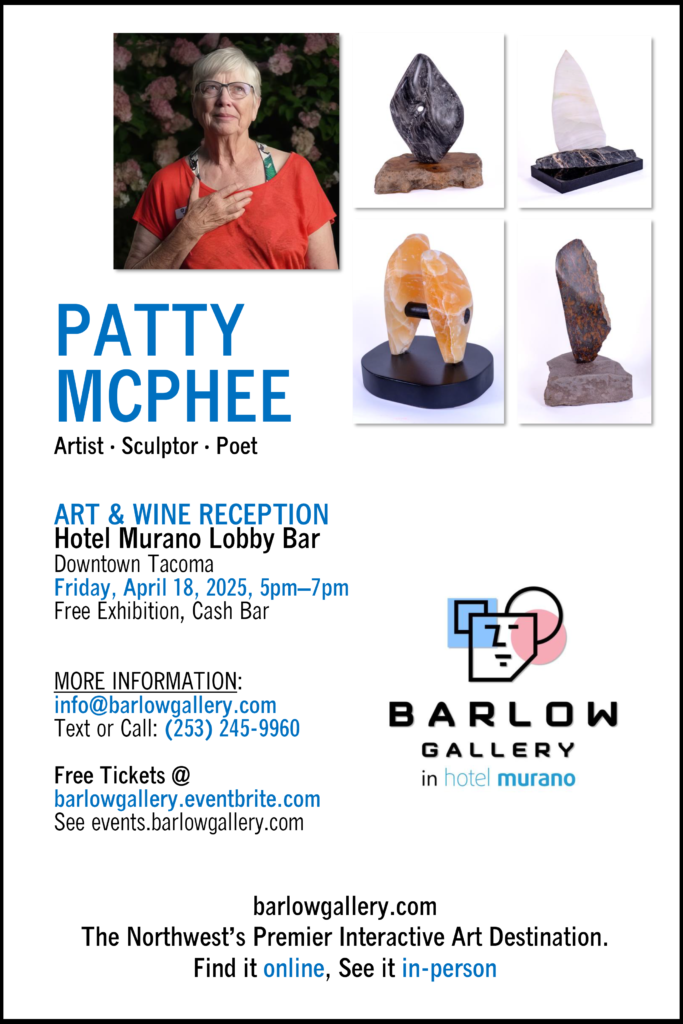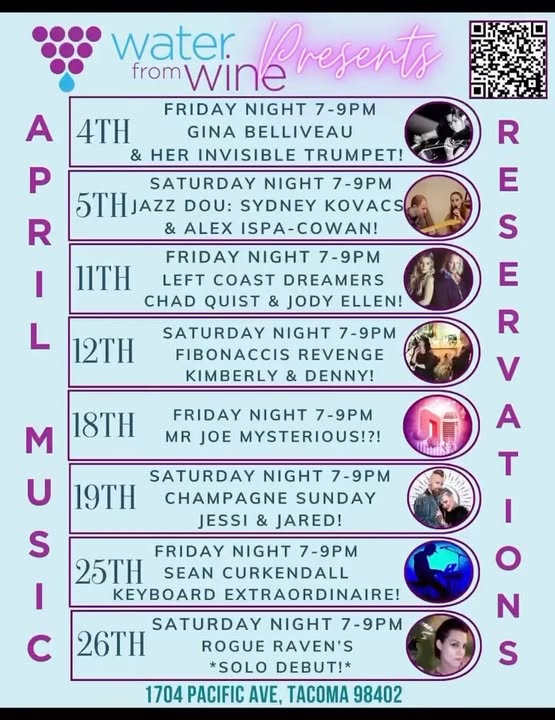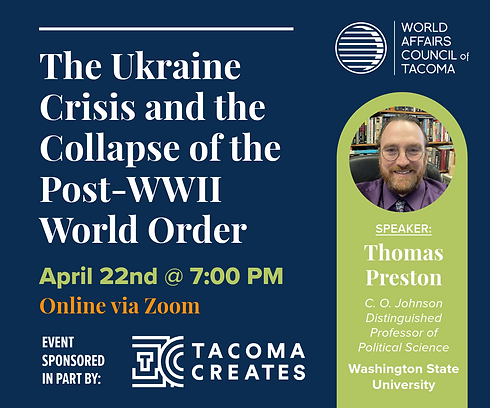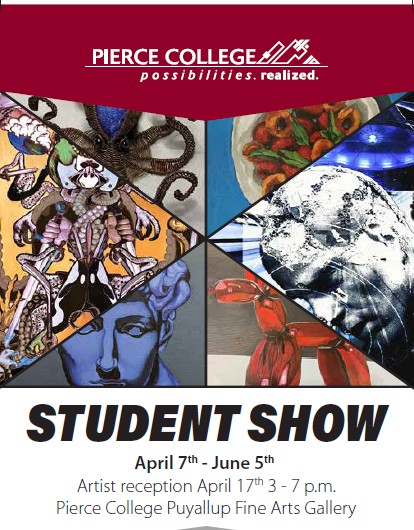
Arts & Entertainment
- The Spring Fair is Here! Here’s Your Guide
- Dates & Hours: April 10 – 13th & April 17 – 20th: Thursdays: 2 p.m. – 10 p.m; Fridays & Saturdays: 10 a.m. – 10 p.m; Sundays: 10 a.m. – 8 p.m.
- Prices: Online: Thursday: Adult $13, Kids (6-12) $11; Weekend: Adults $15, Kids $12; Gate prices: Adults $17.
- General Parking: Free on Thursdays, $15 Friday – Sunday. Premium Lot B: $25-30 depending on the day.
- Construction: Ninth Ave SW is closed. Access the Red Gate from Fourth Ave.
- Weekend Highlights: Weekend 1: BBQ Playoffs, Weekend 2: Building the Next 125 Years with sand sculpture artist
- Other Attractions: rides, food, animals, racing pigs, DockDogs jumping competition, Dinosaur exhibit ($8), Monster truck rides: ($10), Golden Egg Scavenger Hunt for Easter fun.
- Skoolie Thrift Shop Soft Opening
- Skoolie Thrift Shop is transforming their existing 3,000 square-foot shop—where they’ve been converting buses—into the new thrift store! Thanks to your amazing support, they needed a larger space right away. Come support the Skoolie Foundation by shopping the revamped store, and get an exclusive look at real-life Skoolie conversion happening right on site. The active construction zone will be open for you to see as they build and complete projects. Your continued support is appreciated and they can’t wait to welcome you at their grand opening and beyond! They welcome volunteers as they are a community thrift store and programs do more for the neighbors.
- Hope N’ Mic Nights – Open Mics in Honor of Sexual Assault Awareness Month
- Enjoy evenings of creativity, community, and support for survivors! Join us every Thursday in April for HOPE’n Mic, a special open mic night series benefiting Rebuilding Hope in honor of Sexual Assault Awareness Month. Doors open at 5pm, and the show starts at 6pm. There’s no cover charge or fee to perform – just a welcoming space to enjoy a glass of wine or cup of coffee and enjoy some local talent! Huge thanks to Kimball Coffeehouse for hosting the HOPE’n Mic Night series. Let’s raise our voices and create change – one performance at a time! Check it out each Thursday in April at Kimball Coffeehouse in Gig Harbor.
Neighborhood News
- Your Yard Can Be Certified as a Wildlife Habitat
- Did you know you could get your yard certified as wildlife habitat through WDFW? Dive into nature right where you live with WDFW’s free Habitat at Home program! Learn how to create wildlife-friendly spaces, support local species, and connect with nature in your own backyard, school, neighborhood, or apartment. Once approved, you will receive a free habitat sign in the mail! For more information, visit https://wdfw.wa.gov/species-habitats/living/habitat-at-home
- Get Excited – Tacoma is Hosting a Book Fair, Not Just for Kids
- Step into the enchanting world of literature at the Tacoma Book Fair May 24 – 25th at the Waterfront Market, where the passion for books comes alive! This event is a haven for bibliophiles, packed with treasures waiting to be discovered: Endless Books: From rare finds to beloved classics and the newest page-turners, there’s something for every taste and genre. Meet the Authors: Engage in conversations with talented authors who will share their stories, inspirations, and creative journeys. Bookish Memorabilia: Explore unique items that capture the spirit of reading, including collectibles, vintage pieces, and literary-themed art. Vendor Booths: Discover a variety of book-related items like handcrafted bookmarks, journals, bookish apparel, and more from passionate artisans and creators. Live Readings: Let the magic of spoken word draw you in as authors and performers bring their stories to life. Connect with fellow book enthusiasts, exchange recommendations, and revel in the joy that only books can bring. Whether you’re a seasoned collector, an avid reader, or simply curious, the Tacoma Book Fair is the perfect place to unite over a shared love of stories. Join this unforgettable celebration of the written word!
Local Governance
- Special Election April 22nd on Proposition 1
- Proposition 1 is a proposal to fund street repair, maintenance and safety improvements like arterials, sidewalks, bike lanes and pedestrian safety. It would replace expiring taxes with new higher and permanent taxes. Changes would include: 25% increase in property taxes, moving from $.20 per $1,000 to $.25 per $1,000. Utility tax would increase from 1.5% to 2% and unlike the 2015 measure, the permanent taxes won’t expire. The city expects to generate $37 million annually and possibly unlock up to $900 million in total investment over 15 years through grant matching. Planned improvements include 1,100-1,400 lane miles of arterials, 250-300 miles of sidewalks, 130-170 miles of bike infrastructure and maintenance of 5,200-6,200 residential blocks. Voters should also be aware of potential state level tax increases in 2025 including property tax cap increase to address budget shortfalls and gas tax hikes to fund transportation.
- The bottom line is that proposition 1 aims to secure long-term funding for Tacoma’s streets, but at the cost of permanent tax increases. Voters must weigh the benefits against possible additional state hikes. Ballots are due by April 22nd.
Business & Opportunities
- Attention Local Filmmakers! FREE Session of Film Producing 101
- There’s a FREE information session on April 30 hosted by filmmakers Sean Patrick Burke & Syed K. Jamal at The Tacoma Arts Community Center! This is all part of a new film production course called Film Producing 101. This session provides you with more details about the upcoming (free) course, which explores the essential intersection of creativity and logistics. Sean Patrick Burke is a Sundance Award-winning film and television producer with over 15 years of professional experience. Syed K. Jamal is a filmmaker, social entrepreneur, and board member of Tasveer.org, the only Oscar-qualifying South Asian film festival in the world. Film Producing 101 will cover topics such as: • Finding your idea • Writing a script • Importance of genre • Set etiquette & structure • Look books/pitch decks • Finance plans • Schedules & budgets • Pre-production • Principal photography • Post-production • Sales, distribution, and festivals And more! Learn more and register: https://lu.ma/9x36bkmv?tk=CW7CDL
- The 17th Annual Sustainability Expo for Tacomans and Eco-Enthusiasts
- Saturday April 26th at the UW Tacoma campus along the Prairie Line Trail. The artist highlighted will be Teruko Nimura, the current artist in residence at Tacoma Solid Waste. The art installation is called “Upstream Together” and is inspired by Japanese Koinobori (carp windsocks). It is made from repurposed materials and celebrates unity, heritage and sustainability. If you go to the expo you can learn about local sustainability efforts, engage with eco-minded groups and resources as well as experience art, culture and community driven solutions for a greener future.
- Paid Summer Internships Open at the Port of Tacoma
- Applications are now open for the Port of Tacoma’s paid summer internship program. You can learn valuable skills while gaining real world experience and grow your future career in the maritime industry. Learn more and apply here.
A Word From Our Sponsors:

Recreation & Wellness
- Cherry Blossoms Are In Bloom Around the City… Here’s Where to Spot Them
- In 1912, the first Cherry Blossoms hit American soil as a gift from the Japanese people. The window for viewing the full blooms of these trees is relatively short, typically lasting only a few weeks. The most well-known Washington hot spot for viewing is at the University of Washington’s “Quad.” Thankfully, you don’t have to drive to Seattle to see some great views around Tacoma.
- The Japanese Garden at Pt. Defiance Park first established in 1956, the garden is located just north of the pagoda making the view accessible to everyone.
- Wright’s Parks Japanese flowering tree were introduced in 1936 with 27 acres of over 600 trees.
- Wapato Hills Park has a nice view of the plants near the Skip and Laura Vaughn Playfield.
- Chambers Creek Regional Park has a row of sakura trees lining a paved path leading to a labyrinth at the park’s western edge.
- Lakewold Gardens was transformed into a horticulture center in the early 1900s and today hosts vistors to check out all the beautiful blooms.
- From 6th Avenue to 21st Street along Proctor Street near the University of Puget Sound, you will find a lovely display of Cherry Blossoms.
- Tacoma’s Chinese Reconciliation Park has beautiful blooms at the north end of Ruston Way.
- McKinley Avenue from 38th toward McKinley Park, visitors can walk south for about 3/4 of a mile to enjoy the trees.
- The Now Vacant North Tacoma Space Could be Getting an Indoor Pickleball Chain
- The Picklr, a Utah based chain of indoor pickleball facilities launched it’s Tacoma social media last month along with a website for members to sign up. They indicated that the location is in the currently vacant Westgate location that most recently housed BigLots. Their website says there will be 12 courts, a skinny court, a pro shop, private event space and more. The Tacoma location would be the 2nd Washington location with a Seattle location listed as TBD. Permit applications have been started but not yet filed according to the online portal.
- Want to See Tulips But Not Make the Drive to Mount Vernon? There’s a Local Solution
- There’s a new tulip festival in Sumner called Spring Bloom. Located at Knutson Farms 16406 78th St E near Sumner. Though the farm has been operating for years it primarily focused on daffodils and rhubarb. Guests now have the opportunity to visit 5 acres of tulips as well as visit an animal barn, play barn games and visit food trucks. Tickets are $15 but be sure to follow their Facebook page as they post field updates each week so you’ll know when the peak time to visit for you is.
- Spring is Here, Let’s Act Like It… Shop Outside and Shop Local
- Yes as Pacific NorthWesterners we get outdoor activities in the rain. But as our days dry up there are lots (more) of outdoor activities afoot. Consider the Farmer’s Markets and even the patios that will be opening up around town. Pierce County has plenty of markets to check out:
- Tacoma – The Broadway Market – 925 Broadway between 9th & 11th St; open Thursdays 10am – 2pm – Open Now
- Tacoma – Proctor Farmers Market – N 27th and Proctor; Saturdays 9am – 2pm – Open Now
- Tacoma – Eastside Farmers Market – 3500 McKinley Ave E – Tuesdays 3pm – 6pm – June – August
- Puyallup – Puyallup Farmers Market – Pioneer Park – Saturdays 9am – 2pm – April 19th
- Orting – Orting Valley Farmers Market – North Park – Fridays 3pm – 7pm – May 9th – August
- Gig Harbor – Gig Harbor Waterfront Market – Skansie Brothers Park – Thursdays 1pm – 7pm – May 22nd – August
- University Place – University Place Farmers Market – Cirque Park – Fridays 3pm – 8pm – June 6th
- Lakewood – Lakewood Farmers Market – Fort Steilacoom Park – Tuesdays 2pm – 7pm – June – August
- DuPont – DuPont Farmers Market – Clocktower Park – Thursdays 3pm – 7pm May 29th – July
Film & TV Reviews
- TV Series Review: The White Lotus by Elizabeth Mulloy
- Each season of Mike White’s The White Lotus peels back another layer of the human condition, revealing the rot that festers when wealth, privilege, and performance intersect. The first season, set against the idyllic backdrop of Maui, dissected class and privilege. The second, in sun-drenched Sicily, explored desire, fidelity, and relationship dynamics. Now, the third and perhaps most ambitious installment transports us to Thailand, where questions of identity and illusion unravel through a Buddhist framework, resulting in what might be the series’ most thematically dense and morally disquieting chapter yet. It’s messier, more sprawling, but also richer in its ambiguity, and The White Lotus continues to assert itself as one of the most vital shows in contemporary television.
- As with prior seasons, the narrative begins with a death, this time, a body discovered floating serenely in a water lily pond, the aftermath of a shootout that feels both inevitable and surreal. The mystery is not in the whodunit but in the why, as we’re whisked back a week to meet a fresh crop of affluent vacationers. Over the course of their stay, each character is forced to confront the fragile architecture of their identity and the deceptive facades they curate to preserve their place in the social hierarchy. It’s a slow, intoxicating unraveling, but that leaves you wanting for more.
- We’re first introduced to the Ratliff family, a conservative family from North Carolina, who arrive in Thailand under the guise of academic pursuit, accompanying their daughter on a research trip for her thesis on Buddhism. What begins as a seemingly wholesome cultural expedition slowly curdles into psychological disarray. At the center is Timothy Ratliff, played with unnerving ease by Jason Isaacs, whose tightly wound composure begins to fracture when he learns he’s under investigation by the FBI for fraud and money laundering. Rather than confiding in his wife, Victoria (Parker Posey, in a performance that gleefully walks the line between satire and sincerity), Timothy chooses concealment, a choice that triggers a slow-motion implosion of the entire family unit.
- Their three children, each in their own way, are performing versions of themselves to survive the expectations imposed upon them. Saxton (Patrick Schwarzenegger, in what may be the season’s most quietly devastating turn) is desperately clinging to an “alpha male” persona built on his father’s image of success. Piper (Sarah Catherine Hook) is consumed by white guilt, using Buddhism less as a belief system and more as a performative refuge. And Lochlan (Sam Nivola) is a mirror, a people-pleaser so shapeless in identity that he becomes a sponge for others’ emotions and personalities. Victoria, meanwhile, remains somewhat static, a caricature of the tone-deaf Southern matriarch, floating above the emotional wreckage with a kind of oblivious grace.
- Over the course of their week, the Ratliffs are slowly dismantled, each stripped of the illusions they’ve built around themselves. Of the three major narrative arcs this season, theirs is arguably the most compelling, layered, psychological, and, at times, genuinely haunting. The only real misstep is in its resolution: a conclusion that arrives a touch too neatly, undercutting some of the emotional complexity that had been so meticulously built. Still, the Ratliff storyline lingers, a poignant meditation on identity, self-deception, and the ruinous cost of appearances.
- Next, we meet a trio of lifelong friends whose glossy veneer quickly gives way to something far more caustic. Laurie (Carrie Coon, effortlessly commanding), Kate (Leslie Bibb), and Jaclyn (Michelle Monaghan) arrive in Thailand under the pretense of a girls’ getaway, but what unfolds is a slow, razor-sharp dissection of fractured female friendship. Laurie, a high-powered corporate lawyer from New York, is navigating the emotional fallout of a recent divorce and the demands of single motherhood. Kate, a seemingly content housewife from Austin, hides a secret allegiance to Trump-era conservatism—a detail that quietly destabilizes the group’s ideological harmony. And then there’s Jaclyn, a once-sought-after actress now facing the twilight of her career, her footing in the industry growing more uncertain by the day.Though the women exchange smiles and shared memories, the air is thick with unspoken resentments.
- Old rivalries and buried judgments begin to bubble to the surface. Over wine-soaked dinners and passive-aggressive jabs, we watch as the facades crack and the ugliest shades of competitive, performative femininity seep out. It’s not just that they’ve grown apart—it’s that they can no longer pretend they haven’t. The realization that they are no longer the women they once were, or thought they were, turns their vacation into a battleground of identity, relevance, and betrayal.
- This narrative arc centers on the three women not just reckoning with the frayed dynamics of their long-standing friendship—but also grappling with the uncomfortable transition into a new phase of their lives. Their bond is portrayed as both deeply toxic and undeniably tender, a paradox that could have served as fertile ground for a more nuanced exploration of aging, envy, and emotional codependency among women. Carrie Coon delivers a stunning monologue late in the arc, a rare moment of raw vulnerability that hints at the emotional depths the story could have plumbed. But ultimately, the conclusion feels both unearned and rushed, opting for a neat resolution where a messier, more honest one would have resonated far deeper. The storyline had the potential to unpack the complexity and contradictions of female friendship, but instead, it pulls its punches, favoring closure over truth.
- The final set of guests we meet are perhaps the most enigmatic: Chelsea (Aimee Lou Wood, radiating warmth and sincerity) and Rick (Walton Goggins, simmering with quiet intensity). At first glance, they appear completely mismatched. Chelsea is a wide-eyed, free-spirited yoga instructor who sees the good in everyone, a beacon of optimism and gentle energy. Rick, on the other hand, is a man weighed down by grief and unspoken rage. He didn’t come to Thailand for tranquility or transformation. He came for one reason only: to seek justice for his murdered father. Their dynamic is fascinating in its contradictions, a clash of light and shadow, innocence and obsession. As their story unfolds, it becomes clear that beneath the surface of their odd-couple pairing lies something far darker and more complex.
- Though this arc carries the most emotional weight, largely thanks to Chelsea, who feels like the first truly real person we’ve seen check into a White Lotus, it’s also the most structurally chaotic. That messiness becomes especially apparent in the final episode, where character logic seems to evaporate. Why doesn’t Rick immediately urge Chelsea to flee the hotel after confronting his father’s killer? And more bafflingly, why does he return to the scene at all? These unanswered questions aren’t mysterious, they’re frustrating, and they undercut the emotional impact of what should’ve been the arc’s most gripping moments.
- Conceptually, there’s something powerful here: two people whose identities have become dangerously enmeshed, revealing how clinging to pain—or to the idea of someone—can ultimately lead to mutual self-destruction. It’s a compelling theme, a tragic meditation on missed love and unresolved grief. But the execution falters. In trying to balance emotional truth with plot-driven suspense, the arc loses its footing, and what could have been the season’s most resonant storyline ends up feeling muddled and incomplete.
- And of course, it wouldn’t be The White Lotus without a narrative thread following the hotel staff, the often-overlooked but essential perspective that gives the series its critical edge. Unfortunately, this season’s arcs for Belinda (Natasha Rothwell), Fabien (Christian Friedel, criminally underused), Gaitok (Tayme Thapthimthong), and Mook (Lalisa Manobal) feel disappointingly adrift. Unlike previous seasons, where the lives of the workers were intricately woven into the stories of the privileged guests, highlighting stark class divisions and power imbalances, this time around, the separation is too clean, too disconnected. As a result, their narratives feel like afterthoughts, more like narrative filler than integral parts of the story.
- Belinda’s return offers a sense of closure, yes, but it’s hard not to ask: did her arc truly add anything to the larger narrative? The emotional payoff feels thin without the narrative infrastructure to support it. The one exception might be Gaitok, whose storyline, exploring how one corrupts their own identity and beliefs to be seen as desirable or worthy, at least resonates thematically with the season’s core concerns. Still, the lack of meaningful engagement between the staff and the guests, once the beating heart of the show’s social commentary, leaves a noticeable void. The season touches on identity and performance, but forgets one of its most powerful stages: the class divide.
- Overall, this season of The White Lotus leaves me with a swirl of conflicting thoughts. On a technical and tonal level, it remains a masterclass, elegantly shot, sharply acted, and brimming with tension. Episode after episode, I found myself fully absorbed, perched on the edge of my seat as the drama unfolded with White’s signature slow-burn intensity. The performances, across the board, continue to set a high bar, some of the best currently on television. Thematically, the building blocks were all in place for a bold, incisive satire of the ultra-wealthy, one that could have pushed even further into darker, more existential territory. But the season’s execution is where it falters. There’s a sense that the narrative needed one more draft, one more pass to tighten its threads and deepen its emotional logic. By the time the finale arrives, it feels like the season is racing toward a finish line it isn’t entirely prepared for. All the pieces were on the table, but in its rush to conclude, The White Lotus ends up just shy of greatness, ambitious, provocative, but ultimately uneven.
- My Rating: B+
- TV Series Review: Paradise by Elizabeth Mulloy
- Remember back in the mid-to-late 2000s and early 2010s, when there was a wave of drama series that blended science fiction into their narratives? Shows like Revolution (2012–2014), Terra Nova (2011–2012), and FlashForward (2009–2010) all seemed to be chasing the magic of Lost (2004–2010). For a while, that trend seemed to fade away, until I came across Hulu’s Paradise. What begins as a political thriller centered on the president’s assassination quickly morphs into a post-apocalyptic sci-fi story, set in a city buried beneath the Rocky Mountains. It’s about survival at the end of the world, and the forces trying to control what’s left of humanity. It’s quite the throwback, isn’t it? Paradise isn’t flawless, but it’s definitely compelling.
- We follow Xavier Collins (Sterling K. Brown), the lead Secret Service agent tasked with protecting the President of the United States. One morning, during his routine rounds, he discovers President Cal Bradford (James Marsden) dead in his bedroom, an assassination that sets off not only a high-stakes investigation into the president’s murder, but also into the mysterious place they call home: Paradise.
- Paradise is an underground bunker built by billionaires as a last-ditch effort to preserve humanity in the wake of a global catastrophe. While the story unfolds like a familiar nonlinear political thriller, it’s packed with just enough intrigue and tension to keep viewers hooked, even if the writing can be a bit scattershot at times.
- The series is far from flawless, often leaning on tired and frustrating writing tropes to force key plot developments. You’ll recognize the usual suspects: a character who claims to have crucial, game-changing information but inexplicably decides it can wait until morning, only to be conveniently killed before they can reveal it. Or the protagonist’s child who disobeys explicit instructions to stay hidden, attempts to help someone, and inevitably gets caught, derailing the parent’s mission entirely. There’s even a puzzling subplot involving the construction of the underground city: thousands of workers were supposedly involved, yet they vanish from the narrative without explanation once the city is complete. The show is riddled with these narrative shortcuts, which can strain credibility and require a fair amount of suspension of disbelief. Paradise leans heavily on its high-concept premise to propel the story forward, and while that concept is compelling, it sometimes feels like the show is coasting on it rather than building something truly airtight.
- Furthermore, the dialogue in Paradise often feels stilted and unnatural, with much of it consisting of heavy-handed exposition rather than organic, character-driven conversation. It’s the kind of writing where characters talk at each other instead of to each other. Fortunately, the ensemble cast does a remarkable job elevating the material, injecting humanity and emotional weight into even the most utilitarian lines. Sterling K. Brown anchors the series with quiet intensity, portraying Xavier Collins as a man of unshakable conviction navigating an increasingly unstable world. Julianne Nicholson adds layers of depth to what could have been a one-dimensional billionaire antagonist, delivering a performance full of nuance and moral ambiguity that transcends the show’s writing. But it’s James Marsden who delivers the series’ most surprising and affecting performance as President Cal Bradford. Rather than playing into easy caricature, the incompetent or power-hungry leader archetype, Marsden crafts a portrait of a man burdened by impossible choices and haunted by guilt. His portrayal is a slow-burning study in vulnerability and regret, and it’s nothing short of exceptional. If there’s any justice, Marsden deserves to be in serious Emmy consideration for this role.But let me tell you, when Paradise hits its stride, it doesn’t just work, it soars. Nowhere is that more evident than in Episode 7, which stands as a stunning centerpiece of the season, a masterclass in contained storytelling and emotional devastation. In the crowded landscape of apocalyptic fiction, most stories tend to lean on the visual spectacle of destruction, cities crumbling, fire raining from the sky, chaos erupting in the streets. Paradise, however, takes a different and far more chilling route. Instead of explosions and crumbling skylines, Episode 7 turns inward, narrowing its scope to the claustrophobic halls of the White House. There are no grand action set-pieces, just mounting dread, quiet breakdowns, and the agonizing weight of inevitability.
- As the characters come to terms with the unthinkable, that a super volcano eruption in Antarctica has triggered a catastrophic tsunami, and the ensuing panic has sparked nuclear retaliation across the globe, they are faced with the grim reality that billions of lives are about to be lost. The episode becomes less about survival and more about reckoning, with responsibility, failure, and the quiet horror of watching the end unfold from behind locked doors. What makes this episode truly exceptional is its restraint. It’s not about spectacle, but about mood and emotional truth. The writing, direction, and performances converge in a deeply human hour of television. It’s an intimate, pressure-cooker of a bottle episode that forces every character to confront the end not with action, but with silence, fear, and resignation. It’s not just the best episode of Paradise, it’s one of the best pieces of television in recent memory.
- Overall, Paradise is far from a perfect series, but it’s undeniably a fascinating one, and well worth the watch for those drawn to high-concept storytelling. What begins as a familiar political thriller centered on the assassination of a president quickly evolves into something far more ambitious: a brooding, genre-blending science fiction narrative that explores the collapse of civilization from deep beneath the surface, both literally and emotionally. While the writing often stumbles, relying on clunky exposition, predictable tropes, and moments that strain credibility, the show’s core ideas and the strength of its cast elevate it above its flaws. There’s real potential here, and if the creators can refine the storytelling in a second season, Paradise could evolve from an intriguing curiosity into something truly exceptional.
- My Rating: B
Screenshots: We scroll so you don’t have to…














